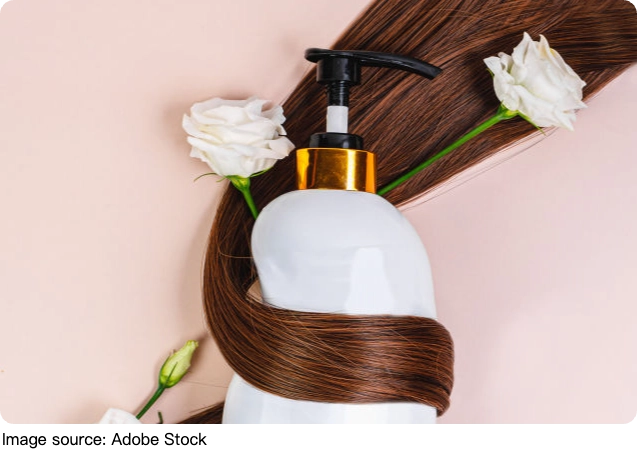Diet and Hair Health

When it comes to hair health, most people think of shampoos, conditioners, and hair masks.
But what if the secret to strong, shiny hair lies in what you eat? The impact of diet on hair health is often overlooked, yet it plays a vital role in the strength, texture, and growth of your hair.
In this article, we'll explore the various nutrients that contribute to healthy hair and how your diet can make a difference. Ready to unlock the secret to beautiful hair? Let's dive in!
1. Protein: The Building Block of Hair
Hair is primarily made of keratin, a type of protein, so it's no surprise that the amount of protein in your diet directly affects hair health. Protein helps with hair growth and repair, keeping your strands strong and preventing breakage.
Protein-Rich Foods
Incorporating enough protein into your daily diet can be achieved through sources such as lean meats, eggs, fish, legumes, and dairy products. For those who follow a plant-based diet, protein-rich alternatives like tofu, quinoa, lentils, and chickpeas are excellent choices.
A protein deficiency can result in thinning hair, slower hair growth, and increased shedding. In fact, inadequate protein intake is one of the most common causes of hair loss. To keep your hair healthy, aim for a well-balanced diet rich in protein to support your hair's natural growth cycle.
2. Iron: Preventing Hair Thinning
Iron is essential for healthy hair, as it helps deliver oxygen to follicles. A lack of it can cause anemia, leading to hair thinning and loss.
Iron-Rich Foods
Good sources of iron include spinach, red meat, beans, lentils, and fortified cereals. If you're vegetarian or vegan, combining plant-based iron sources with vitamin C-rich foods (like oranges, bell peppers, and tomatoes) can help improve iron absorption.
To ensure your body is getting enough iron, it's important to include these iron-rich foods in your diet regularly. If you're experiencing hair thinning, it may be worth getting your iron levels checked by a healthcare provider to determine if supplementation is necessary.
3. Omega-3 Fatty Acids: Nourishing the Scalp
Omega-3 fatty acids are essential fats that play a vital role in maintaining a healthy scalp and promoting hair growth. These fats nourish the hair follicles, reducing dryness and making hair appear shinier and more hydrated.
Omega-3-Rich Foods
Fatty fish such as salmon, mackerel, and sardines are rich in omega-3s, while plant-based options include walnuts, chia seeds, and flaxseeds. Omega-3s support scalp health by reducing inflammation, helping prevent hair loss, dandruff, and dryness—creating ideal conditions for hair growth.
4. Biotin: Boosting Hair Growth
Biotin (vitamin B7) plays a key role in hair growth by supporting keratin production—the protein in hair, skin, and nails. A deficiency can lead to thinning hair, brittle nails, and skin problems.
Biotin-Rich Foods
Great sources of biotin include eggs, almonds, sweet potatoes, spinach, and avocados. Eating these regularly can support hair health. If you suspect a deficiency, consult a doctor before considering supplements.
5. Vitamin C: Strengthening Hair Strands
Vitamin C is a powerful antioxidant that plays a significant role in protecting hair from oxidative stress and environmental damage. It also helps the body absorb iron, which, as mentioned earlier, is essential for hair growth.
Vitamin C-Rich Foods
Vitamin C-rich foods include citrus fruits, strawberries, kiwi, papaya, bell peppers, and broccoli. This nutrient supports collagen production, strengthens hair follicles, and helps prevent breakage.
6. Zinc: Supporting Hair Repair
Zinc is an essential trace mineral that supports the body's ability to repair and regenerate tissues, including hair follicles. A zinc deficiency can lead to hair loss, and research has shown that maintaining adequate zinc levels can promote hair growth and prevent hair shedding.
Zinc-Rich Foods
Lamb, pumpkin seeds, cashews, and chickpeas are excellent sources of zinc. If you're vegetarian or vegan, consider adding more whole grains, legumes, and nuts to your diet for zinc.
If you're experiencing unexplained hair loss, it might be worth checking your zinc levels, as deficiencies in this mineral can significantly impact your hair health.
7. Hydration: Keeping Your Hair Moisturized
Although it's often overlooked, proper hydration is crucial for maintaining healthy hair. When you're dehydrated, your hair can become dry, brittle, and more prone to breakage. Hydrating your hair from the inside out ensures it retains moisture and remains shiny and smooth.
Staying Hydrated
Stay hydrated by drinking at least 8 glasses of water daily, especially if you're active. Eating water-rich foods like watermelon, cucumber, and leafy greens also helps keep your hair healthy and nourished.

8. The Importance of a Balanced Diet
While specific nutrients support hair health, a balanced diet is crucial. Rather than focusing on just a few, aim for a variety of vitamins, minerals, and macronutrients to give your hair everything it needs to grow strong and healthy.
Avoiding Crash Diets
Extreme diets that severely restrict calories or certain food groups can lead to nutrient deficiencies and hair loss. It's important to adopt a healthy, sustainable eating pattern that supports your overall well-being, including the health of your hair.
Conclusion: Nourish Your Hair from Within
Your hair is a reflection of your overall health, and diet plays a significant role in determining the strength, growth, and appearance of your locks. By incorporating nutrient-rich foods into your diet, you can nourish your hair from within and help it grow to its full potential.
While topical treatments like shampoos and conditioners can certainly help, a diet rich in protein, iron, omega-3s, vitamins, and minerals is the foundation for long-lasting hair health. Take a holistic approach to hair care, and your hair will thank you. Ready to make some healthy changes? Start by adjusting your diet to boost your hair health today!


